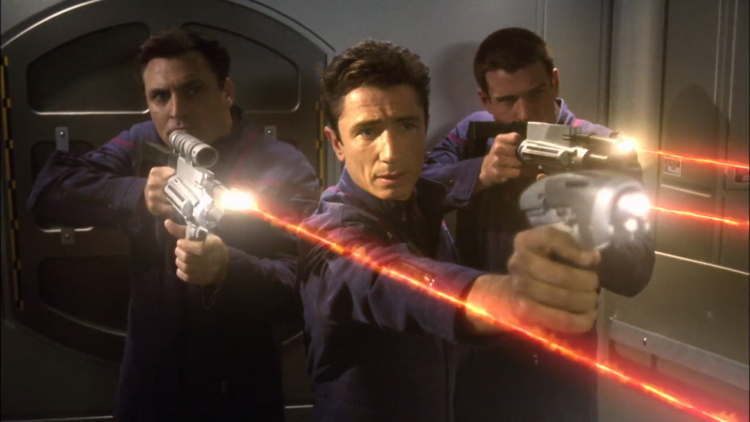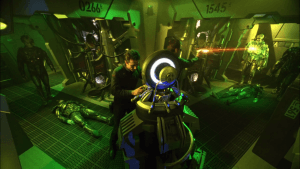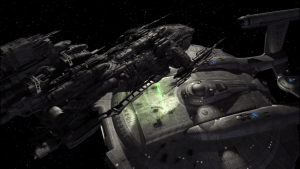
As the Borg attack, Archer orders Reed to accompany him to the transporter room and Phlox begins his radiation treatment. Reed and Archer beam aboard the transport, the interior of which has been completely assimilated. As the transport continues to hammer Enterprise with weapons fire, Archer looks for anyone he might be able to rescue. He and Reed encounter a pair of Borg and open fire. Fortunately, Reed’s upgrades to the phase pistols worked. Less fortunately, Archer’s scans reveal that one of the drones they just shot used to be a member of the research team. More drones attack, though they’re able to fend them off. Still others board Enterprise. Upon locating an EPS conduit, Reed plants a series of charges, completing his task just as the Borg adapt to their upgraded weaponry. The two beam back to Enterprise and detonate the charges just as Tucker restores weapons and engines. Simultaneously, the Borg boarding party beams back to the transport. Having accepted that there’s no one on the transport that he can help, Archer gives the order to destroy the ship.
With the crisis past, Enter resumes its original heading. Phlox, still recovering from his experience, tells Archer that during his limited contact with the collective consciousness, he was cognizant of a message they were trying to send, a numerical sequence repeated over and over. Later, in his ready room, Archer tells T’Pol that he’s figured out what the message was: Earth’s spatial coordinates, sent deep into the Delta Quadrant. T’Pol notes that it would take two centuries for the message to reach its destination, assuming its received at all. Archer remains grim, worrying that all they’ve done is postpone the inevitable invasion… until the twenty-fourth century.
I really just have one thing to say about this episode. Well, okay not just one thing. I’m me, after all. But it all boils down to one thing. One word, really.
Why?
Just… why? What was the point of this episode? To be clear, it’s not bad, but nor is it good enough to justify its own existence given how incredibly unnecessary it is and how frankly self-indulgent it’s premise feels. I mean, I get the appeal of the Borg. I do. On a fundamental level, the Borg are cool. Even after the diminishing returns that accompanied their frequent appearances in the later seasons of ‘Star Trek: Voyager’, the Borg are still cool. You’ll get no argument from me on that score.
But at the end of the day, the thing about ‘Regeneration’ is not that it’s a bad episode, it’s just – as I said – unnecessary. Even with the (to my mind somewhat tenuous) in-continuity rationale of ‘First Contact’, featuring the Borg on a show set two hundred years before they’re supposed to be anywhere near Earth is a pretty big gimme. If you’re going to do something like that, it has to be for a better reason than “the Borg are cool.” When an episode has that big of an ask built into its premise, it has to earn that. And while ‘Regeneration’ is enjoyable in a “bear versus shark” sort of way, it never quite manages to justify its own existence in that sense. The Borg are here. They fought Archer’s Enterprise. So what? While it certainly doesn’t break ‘Trek’ continuity, it doesn’t exactly add anything either.

The worst offender in that regard might actually be the ending. The ending is trying so hard – maybe even a bit too hard – to be ominous, and it comes so close to working, but it just falls flat. Bottom line, it leaves viewers to wonder whether or not this signal is how the Borg learned about the Federation… just in time for them to start running into humans on a regular basis anyway. So – I ask yet again – what’s the point?
In fact, whatever impact that ending might’ve had is further diluted by the fact that it’s providing yet another way the Borg could have “discovered” humanity. If you’ll indulge me while I turn into a full-on Continuity Fanboy Whore for a moment, we know from the events of ‘Q Who’ that the Borg knew about us before we knew about them – at least as early as the events of ‘The Neutral Zone’ a year prior. And as the retcons piled on, we can venture an educated guess as to how that happened. Guinan’s people, the El-Aurians, were aware of Humanity as early as the nineteenth century (as evidenced by her presence on Earth in the ‘Time’s Arrow’ two-parter). They, in turn, were assimilated by the Borg sometime prior to ‘The Next Generation’. Though it’s never explicitly stated, it’s a fair assumption that this happened sometime in the late twenty-third century, hence the presence of El-Aurian refugees (including Guinan and Dr. Soran) in the prologue scene of ‘Star Trek: Generations’. The Borg would then, of course, know everything the assimilated El-Aurians knew. Or, if we discount that, there’s also the assimilation of Seven of Nine’s family (detailed in ‘The Raven’ and ‘Dark Frontier’), which took place about a decade before ‘The Next Generation’.
Whew. And that was all off the top of my head, if you can believe that! But I digress.
 But if you can get past all that, it’s a fun enough episode in its own right. And something of an ‘Enterprise’ apologist, I do feel a bit odd criticizing it this harshly. (Though if you think this is harsh, just wait until I get to ‘These Are The Voyages…’) So let’s say some nice things! Right up front, David Livingston is one of those directors who seem to understand on an intuitive level how to direct ‘Star Trek’. And he ought to, with some sixty-two episodes to his credit! The action is rock solid, and the visuals are pretty cool too, particularly the makeup as the Tarkaleans (who we see for the first and only time, though they’ve been name-dropped for years) and Phlox progress through the assimilation process. I also quite enjoyed seeing the design of the arctic transport evolve as it is increasingly Borgified throughout the episode. Once it gets into space, it looks different (and Borgier) every time we see it.
But if you can get past all that, it’s a fun enough episode in its own right. And something of an ‘Enterprise’ apologist, I do feel a bit odd criticizing it this harshly. (Though if you think this is harsh, just wait until I get to ‘These Are The Voyages…’) So let’s say some nice things! Right up front, David Livingston is one of those directors who seem to understand on an intuitive level how to direct ‘Star Trek’. And he ought to, with some sixty-two episodes to his credit! The action is rock solid, and the visuals are pretty cool too, particularly the makeup as the Tarkaleans (who we see for the first and only time, though they’ve been name-dropped for years) and Phlox progress through the assimilation process. I also quite enjoyed seeing the design of the arctic transport evolve as it is increasingly Borgified throughout the episode. Once it gets into space, it looks different (and Borgier) every time we see it.
Also, if you have any amount of prior knowledge of the Borg it does add to the tension. In fact, that might be my favorite thing about the episode, especially as someone who grew up as a ‘Trek’ fan as most of the great Borg stories were being told. That is to say, I was learning about the Borg as the crews of the various nineties ‘Trek’ shows did. And by the end of ‘Voyager’, we’d learned quite a bit about the Borg! So to go from that to a scenario in which you the viewer know more about the Borg than anyone on screen is an interesting reversal. It means, for example, that you know just how bad an idea it is for Enterprise to bring those Tarkaleans on board after they’ve been injected with nanoprobes, or that – had Archer and Reed not shot first and asked questions later – they very likely would have been able to make it to the arctic transport’s EPS conduit and plant the charges almost entirely unimpeded.
But what do you think? Am I being too harsh or was the episode a misstep? Let me know in the comments, and as always be sure to check back in two weeks for the next ‘Final Frontier Friday’, when I promise we’ll move on from the Borg!
